unit3知识点梳理
人教版九年级英语Unit-3-知识点总结

Unit 3 知识点总结Unit 3 Could you please tell me where the restrooms are?一、短语总结1. buy some stamps 买一些邮票2. a pair of 一双,一对3. get to the bookstore 到书店4. on one’s right / left 在某人的右边 / 左边5. beside the bank 在银行旁边6. turn right / left 右拐 / 左拐7. between the flower store and the bookstore 在花店和书店之间8. go past the bookstore 经过书店9. be excited to do sth. 对做某事感到兴奋10. try the rides 尝试乘骑项目11. start with ... 以……开始12. need to do sth. 需要做某事13. come on 快点儿14. hold one’s hand抓住某人的手15. at first 首先;最初16. get hungry 饿了17. serve delicious food 提供美味的食物18. on one’s way to ...在某人去……的路上19. pass by 路过;经过20. a rock band 一个摇滚乐队21. walk up to sb. 向某人走去22. come a little earlier 早点儿来23. pardon me 抱歉,对不起;什么,请再说一遍24. mail a letter 寄信25. go east 朝东走26. visit a foreign country 去国外游览27. ask for help politely 礼貌地请求帮助28. sound less polite / impolite 听起来不怎么礼貌 / 不礼貌29. a direct question 一个直接的问题30. in different situations 在不同的情况下31. depend on 取决于32. speak to sb. 和某人说话33. school trip 学校旅行34. such as 诸如35. e-mail address 电子邮箱地址36. lead into a request 导入请求37. spend time (in) doing sth. 花费时间做某事38. trouble sb. 麻烦某人39. communicate better with other people 更好地与他人交流40. an underground parking lot 一个地下停车场41. pass the salt 递一下盐42. change some money 兑换一些钱43. go on a short study vacation 去游学44. an English-speaking country 一个讲英语的国家45. in a rush 急忙地46. on time 按时二、短语用法集合1.not …… until……直到……才……例如:You never know until you try something.2.let’s do sth 咱们做某事吧!3.spend time doing sth 话费时间做某事4.thank sb for doing sth 为做某事而感谢某人5.would like to do sth 想要做某事6.look forward to doing sth 盼望做某事7.It seems (that)…例如:It seems a rock band plays there every evening.8.Could you please tell me... ?例如:Could you please tell me how to get to the post office?9.take的用法① take some food take some medicine (=have吃,喝)② take notes做笔记③ take one’s temperature( 测量)④ It takes sb some time/money to do somet hing (花费,需要)⑤ I’ll take this coat.(=buy购买)⑥ take somebody / something to(带领,拿去,取)⑦ take a train to Chongqing(乘坐)⑧ take off(脱下)10.turn 的用法:① turn to page 80翻到 80 页② It is your turn. 轮到你了。
2023四年级英语下册Unit3Myday知识点梳理素材译林牛津版

Unit 3知识点总结四会单词ually通常2. go to school去学校3. in the morning在上午4. in the afternoon 在下午5.go home回家6. homework 家庭作业7. watch TV 看电视8. in the evening 在晚上三会单词1. have lunch 吃午饭2. play football 踢足球3. have dinner 吃晚饭4. go to bed 睡觉5. at night 在夜里词组1. at seven forty 在七点四十2. four lessons 四节课3. have lunch 吃午饭4.at four forty 在四点四十5. do my homework 做我的家庭作业6.at five thirty 在五点半7.at six fifteen 在六点一刻 8. every day 每天9. in the morning 在上午 10. in the afternoon 在下午11.in the evening 在晚上 12.at night 在夜里13.get up 起床 14.play football 踢足球15. have dinner 吃晚饭 16.go to bed 睡觉17.go to school 去学校 18.go home 回家19.watch TV 看电视 20.go to bed 睡觉21. what time 什么时间 22. over there 在那边四会三会句型1.I get up at seven. 我七点起床。
2.I usually go to school at seven forty. 我通常在七点四十去学校。
3.I have four lessons in the morning. 我在上午有四节课。
4.I have lunch at twelve. 我在十二点吃午饭。
九年级英语unit3知识点归纳
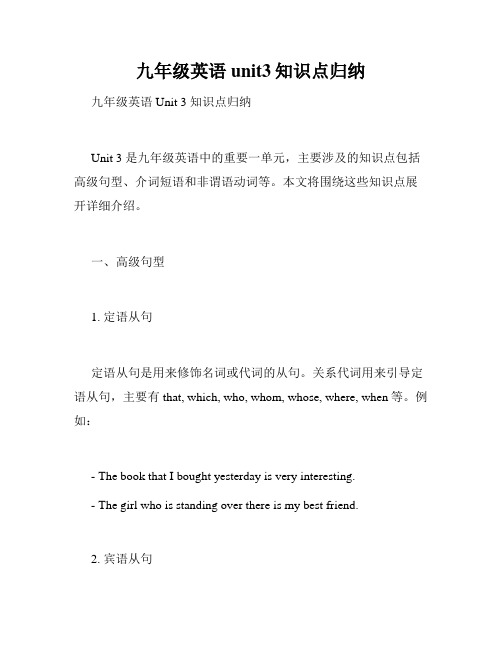
九年级英语unit3知识点归纳九年级英语Unit 3 知识点归纳Unit 3 是九年级英语中的重要一单元,主要涉及的知识点包括高级句型、介词短语和非谓语动词等。
本文将围绕这些知识点展开详细介绍。
一、高级句型1. 定语从句定语从句是用来修饰名词或代词的从句。
关系代词用来引导定语从句,主要有that, which, who, whom, whose, where, when等。
例如:- The book that I bought yesterday is very interesting.- The girl who is standing over there is my best friend.2. 宾语从句宾语从句是在主句中作为宾语的从句。
常用的引导词有that, whether, if等。
例如:- I don't know if it will rain tomorrow.- She asked me whether I had finished my homework.3. 状语从句状语从句是用来修饰主句的副词从句,常用的引导词有when, while, after, before, since, until等。
例如:- He always listens to music while he is doing his homework.- I will call you back as soon as I finish my work.二、介词短语介词短语在句中起着修饰或者指示的作用,可以表达时间、地点、原因、方式等。
常见的介词短语有at, in, on, of, for, with, by等。
例如:- I will meet you at the park tomorrow.- She is good at playing the piano.三、非谓语动词非谓语动词是指在句子中作为非主谓部分的动词形式,包括动词不定式、动名词和现在分词。
unit3-holiday-fun知识点梳理
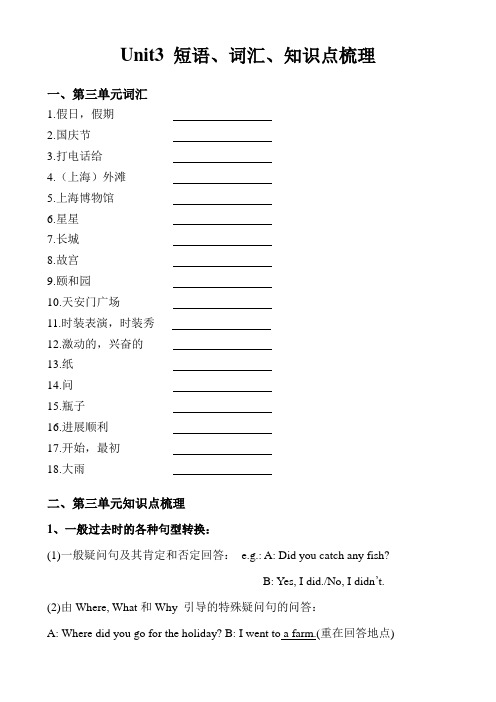
Unit3 短语、词汇、知识点梳理一、第三单元词汇1.假日,假期2.国庆节3.打电话给4.(上海)外滩5.上海博物馆6.星星7.长城8.故宫9.颐和园10.天安门广场11.时装表演,时装秀12.激动的,兴奋的13.纸14.问15.瓶子16.进展顺利17.开始,最初18.大雨二、第三单元知识点梳理1、一般过去时的各种句型转换:(1)一般疑问句及其肯定和否定回答:e.g.: A: Did you catch any fish?B: Yes, I did./No, I didn’t.(2)由Where, What和Why 引导的特殊疑问句的问答:A: Where did you go for the holiday? B: I went to a farm.(重在回答地点)A: What did you do for the holiday? B:I visited the Shanghai Museum.(重在事情。
) A:Why did you call me? B: Because I wanted to give you the fish. (重在陈述原因。
) 针对上述的三种句型的回答,也可以采用逆向的对画线部分提问:a : I called you because I wanted to give you the fish?(对画线部分提问)(3)由How引导的特殊疑问句的问答:A:How was your holiday? B: It was great fun.2、the的用法:本单元重在讲述travel experiences(旅游经历),旅游景点都是唯一的,作为唯一性的名词前均须加上the。
如:the Bund, the Shanghai Museum, the Great Wall, the Palace Museum, the Summer Palace, the Tian’anmen Square.3、excited 后接不同介词的意思对比:be excited by 被……而激动;be excited for 因/为……而激动;be excited at 与be excited about常互用,后+v-ing. )4、有关动词过去式的变化:不规则动词有:(前一单元出现过的不再重复。
七年级英语unit3知识点总结
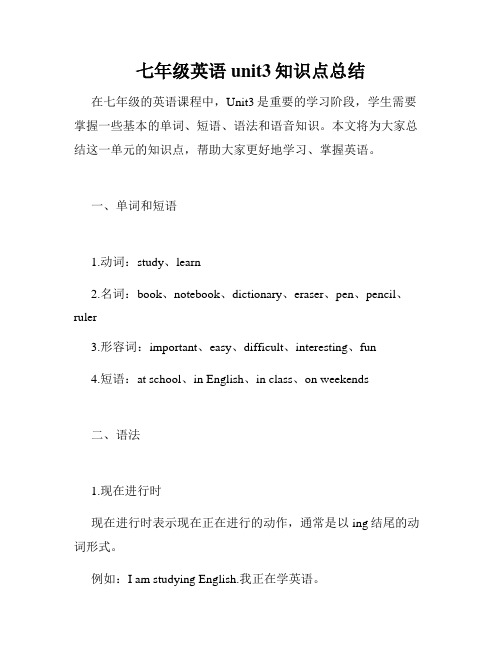
七年级英语unit3知识点总结在七年级的英语课程中,Unit3是重要的学习阶段,学生需要掌握一些基本的单词、短语、语法和语音知识。
本文将为大家总结这一单元的知识点,帮助大家更好地学习、掌握英语。
一、单词和短语1.动词:study、learn2.名词:book、notebook、dictionary、eraser、pen、pencil、ruler3.形容词:important、easy、difficult、interesting、fun4.短语:at school、in English、in class、on weekends二、语法1.现在进行时现在进行时表示现在正在进行的动作,通常是以ing结尾的动词形式。
例如:I am studying English.我正在学英语。
2.一般现在时一般现在时表示经常、习惯性地发生的动作或状态。
例如:I go to school every day.我每天都上学。
3.人称代词人称代词是表示人的身份的代词,用来代替某个人或一组人。
例如:I(我)、you(你)、he(他)、she(她)、it(它)、we(我们)、they(他们)。
三、语音1.长音和短音长音和短音是英语中的两种基本发音方式,必须掌握。
例如:cat(短音)、cake(长音)2.重读音节在英语单词中,有些音节的发音比其他音节更强烈,这种音称为重读音节。
例如:computer(com-PUT-er)以上就是七年级英语Unit3的主要知识点总结,希望本文对大家的英语学习有所帮助。
在学习英语的过程中,要积极听、说、读、写,多练习,做到理论与实践相结合,才能在英语学习中获得更好的成就。
译林版四年级上册Unit3Howman知识点梳理

How many表示多少个,后接名词复数,询问物体的数量,回答也要用包含数量的词。
例:How many stickers do you have?
你有多少张贴纸。
I have thirteen stickers.
我有十三张贴纸。
划线句对数量提问,特殊疑问词用 How many
错误:Can I have a look your new skirt?(x)缺少 at
have a look at...表示看一看...,后
接看的物体。
回答一般用Sure.
4.many/much 考点
many表示许多,后接名词复数,只能修饰可
数名词;
例:many balls 许多球
much表示许多,只能修饰不可数名词;
Unit 3 How many?
1.单词、词组考点
数词:十三 thirteen十四 fourteen 十五 fifteen 十六 sixteen十七 seventeen 十八 eighteen 十九nineteen
其他:盒子(复)boxes贴纸 sticker 乒乓球 table tennis 可爱的lovely 非常滑稽 very funny 许多球many balls
例:We have fifteen toys.(对划线部分提问)
How many toys do you have?
3.have a look (at)...考点
have a look表示看一a look?(✓)
正确 Can I have a look at your mew skirt?
它看起来如此滑稽又可爱。
例:much bread许多面包
*a lot of 表示许多,既可修饰可数名词,也可
人教版九年级全一册英语Unit3单元语法知识点总结
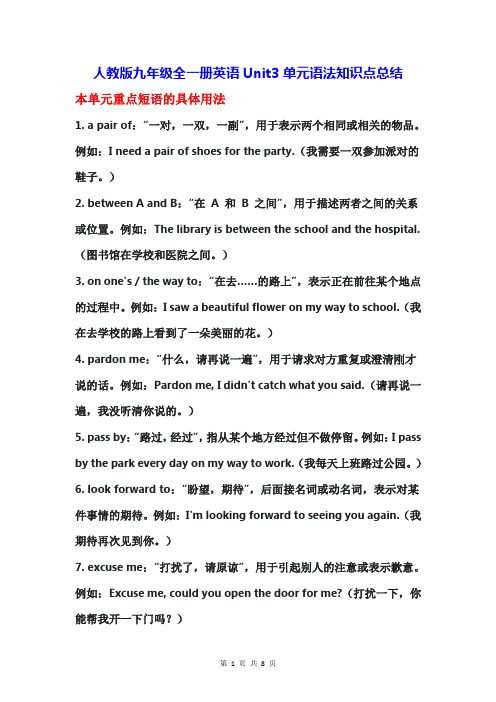
人教版九年级全一册英语Unit3单元语法知识点总结本单元重点短语的具体用法1. a pair of:“一对,一双,一副”,用于表示两个相同或相关的物品。
例如:I need a pair of shoes for the party.(我需要一双参加派对的鞋子。
)2. between A and B:“在A 和B 之间”,用于描述两者之间的关系或位置。
例如:The library is between the school and the hospital.(图书馆在学校和医院之间。
)3. on one's / the way to:“在去……的路上”,表示正在前往某个地点的过程中。
例如:I saw a beautiful flower on my way to school.(我在去学校的路上看到了一朵美丽的花。
)4. pardon me:“什么,请再说一遍”,用于请求对方重复或澄清刚才说的话。
例如:Pardon me, I didn't catch what you said.(请再说一遍,我没听清你说的。
)5. pass by:“路过,经过”,指从某个地方经过但不做停留。
例如:I pass by the park every day on my way to work.(我每天上班路过公园。
)6. look forward to:“盼望,期待”,后面接名词或动名词,表示对某件事情的期待。
例如:I'm looking forward to seeing you again.(我期待再次见到你。
)7. excuse me:“打扰了,请原谅”,用于引起别人的注意或表示歉意。
例如:Excuse me, could you open the door for me?(打扰一下,你能帮我开一下门吗?)8. get some information about:“获取有关……的一些信息”,用于表示获取关于某个主题的信息。
Unit3 My friends知识点归纳

Unit3 My friends知识点归纳二、单词1、my 我的2、friend朋友3、friends 朋友们4、she 她5、she’s=she is她是6、he他7、he’s =he is 他是8、am是is是are是9、too也10、this这,这个11、sister姐姐,妹妹12.goodbye 再见13. Tina蒂娜四、句型1. She’s Yang Ling .她是杨玲。
She’s my friend. 她是我的朋友。
2. He’s Mike . 他是迈克。
He’s my friend too. 他也是我的朋友。
3. See you next time .下次见。
4. This is Tina. 这是蒂娜。
She’s my sister.她是我的妹妹。
Hi , Tina .蒂娜,你好。
5. He is my friend, Mike. 他是我的朋友迈克。
6. Who’s she? 她是谁?She’s my friend, Yang Ling. 她是我的朋友杨玲。
7. Mike and Yang Ling are good friends. 迈克和杨玲是好朋友。
8. We are good friends. 我们是好朋友。
9.Goodbye, my friends. 再见,我的朋友们。
10. Sing the song with my friends. 和我的朋友们一起唱这首歌。
11. I can talk about my friends. 我会谈论我的朋友们。
五、复习巩固一年级上册Unit3 This is Miss LiMum, Dad, this is Miss Li.A: This is my cousin. B: She’s cute.A: Is this your mum? B: No. She’s my aunt.二年级上册Unit1 She’s my auntaunt 姑妈;姨妈uncle 叔叔;伯伯cousin 堂表姐妹tall高的short 矮的Mr Green格林先生二年级下册Unit4 I have big eyes结合本单元知识使用句型He / She has … eyes/ears/hair. He / She has a …mouth/nose/face. 描述五官。
Unit3 electricity 知识点梳理-牛津上海版八年级英语下册

8B Module 1 Nature and environment第三单元电Unit 3 Electricity词汇:1.servant n. 仆人['sɜːv(ə)nt]2.electricity n. 电;电能[ɪˌlekˈtrɪsəti]3.trick n. 诡计;花招v. 哄骗[trɪk]4.foolish adj. 愚蠢的[ˈfuːlɪʃ]5.wire n. 金属丝;金属线[ˈwaɪə(r)]6.meter n. 计量器计量表[ˈmiːtə(r)]7.measure v.测量;度量n.措施/衡量[ˈmeʒə(r)]8.bill n. 账单[bɪl]9.monthly adj./adv. 每月一次的[ˈmʌnθli]10.explanation n. 解释;说明[ˌekspləˈneɪʃn]11.careful adj. 小心的;谨慎的[ˈkeəfl]12.scratch v./n. 挠;搔[skrætʃ]13.invisible adj. 看不见的:隐形的[ɪnˈvɪzəbl]14.bulb n. 电灯泡[bʌlb]15.bury v. 埋藏[ˈberi]16.politely adv.有礼貌地:客气地[pə'laɪtlɪ]17.grin v./ n.露齿而笑[ɡrɪn]18.contain v.包含;含有;容纳[kənˈteɪn]19.clear adj.明白清楚的v.清理[klɪə(r)]20.iron n.熨斗[ˈaɪən]21.switch v./n. v.开或关(电器)n.开关[swɪtʃ]22.off adv. 不连接:不工作[ɒf]23.lock v./n. (用锁)锁上[lɒk]24.test v.测试实验n. 测验试验[test]25.encourage v. 鼓励[ɪnˈkʌrɪdʒ]26.behave v. 表现[bɪˈheɪv]27.polite adj. 有礼貌的[pəˈlaɪt]28.staff n. 全体职工[stɑːf]29.customer n. 顾客[ˈkʌstəmə(r)]词组:1.heat energy 热能2.moving energy 动能3.light energy 光能4.sound energy 声能5.a dangerous servant 一个危险的仆人6.trick sb. 哄骗某人7.look foolish 看上去愚蠢的8.flow through a wire 在一根金属线中流过9.measure the amount you use测量你使用的数量10.get a bill for sth.monthly 每月得到一份某物的账单11.in a way partly 在某种程度上12.an explanation 一个解释13.be careful with... 小心对待…谨慎处理14.scratch one's head 挠某人的头15.change electricity into different forms/kinds of energy把电转变成不同形式的能量16.connect to (使)连接;联结17.be buried under the street被埋在街道下18.a power station 一个发电厂19.ask politely 有礼貌地询问20.a grin on one's face 在某人脸上的一个露齿而笑21.contain electricity 包含电22.switch off=turn off 关掉(电灯,电器等)e electricity in one way or another 用一种或另一种方式使用电24.churn the butter 搅拌黄油。
仁爱版八年级上册unit3知识点
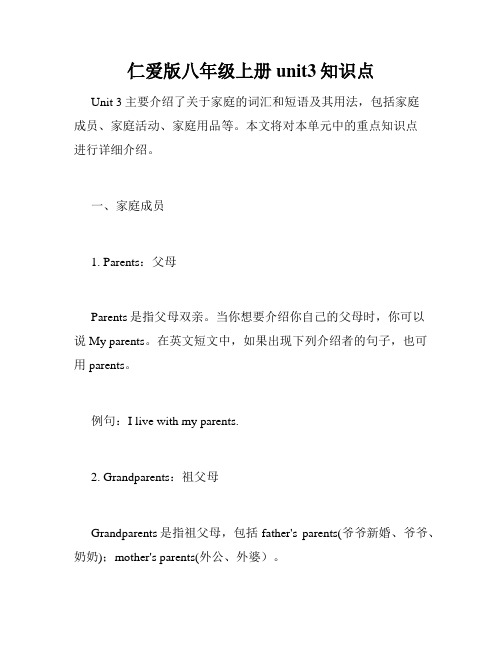
仁爱版八年级上册unit3知识点Unit 3主要介绍了关于家庭的词汇和短语及其用法,包括家庭成员、家庭活动、家庭用品等。
本文将对本单元中的重点知识点进行详细介绍。
一、家庭成员1. Parents:父母Parents是指父母双亲。
当你想要介绍你自己的父母时,你可以说My parents。
在英文短文中,如果出现下列介绍者的句子,也可用parents。
例句:I live with my parents.2. Grandparents:祖父母Grandparents是指祖父母,包括father's parents(爷爷新婚、爷爷、奶奶);mother's parents(外公、外婆)。
例句:I often visit my grandparents.3. Uncle:叔叔/伯伯Uncle可以指叔叔或者伯伯。
在英文中没有明显的区分,只有伯伯(父亲兄弟)、叔叔(父亲弟弟)。
例句:My uncle lives in Canada.4. Aunt:阿姨/伯母Aunt是指阿姨或者伯母,和Uncle一样,并没有明显的区分。
需要根据实际情况进行判断。
例句:My aunt is a teacher.二、家庭活动1. Have a picnic:去野餐Have a picnic是指去外面野餐。
这是一个很好的家庭活动,你可以和家人一起享受阳光和大自然。
例句:We are going to have a picnic this weekend.2. Play board games:玩桌游在家里玩桌游也是一个很好的家庭活动。
这可以增加家庭成员之间的互动,并且在享受游戏的同时,还可以提高智力。
例句:We often play board games on Saturday nights.3. Watch TV:看电视在家里看电视是很多家庭成员都喜欢的活动。
不过需要注意的是,如果看电视时间过长,会影响家庭成员之间的交流。
高一英语新人教选择性必修一知识点梳理 Unit 3
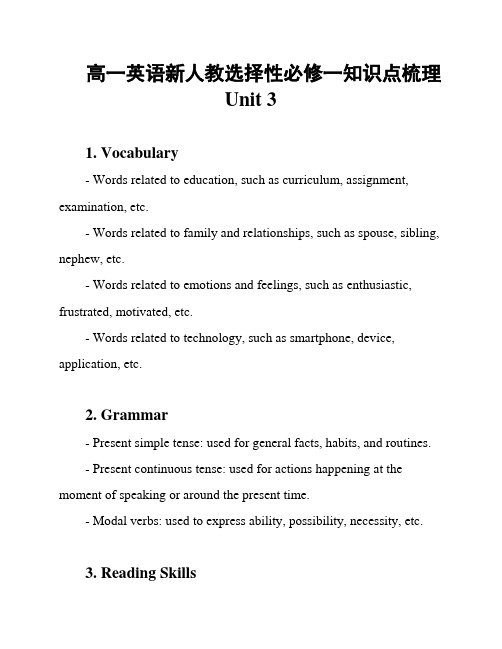
高一英语新人教选择性必修一知识点梳理Unit 31. Vocabulary- Words related to education, such as curriculum, assignment, examination, etc.- Words related to family and relationships, such as spouse, sibling, nephew, etc.- Words related to emotions and feelings, such as enthusiastic, frustrated, motivated, etc.- Words related to technology, such as smartphone, device, application, etc.2. Grammar- Present simple tense: used for general facts, habits, and routines.- Present continuous tense: used for actions happening at the moment of speaking or around the present time.- Modal verbs: used to express ability, possibility, necessity, etc.3. Reading Skills- Skimming: quickly reading the text to get a general understanding of the main ideas.- Scanning: searching for specific information in the text.- Understanding context: inferring the meaning of words or phrases based on the surrounding text.- Identifying main ideas: recognizing the main points or arguments in a passage.- Making inferences: drawing conclusions based on the information given in the text.4. Listening Skills- Listening for gist: understanding the main idea or topic of a conversation or lecture.- Listening for specific information: focusing on particular details or facts.- Note-taking: writing down important points or key details while listening.- Understanding context and tone: inferring meaning from the speaker's tone of voice or the overall situation.- Identifying supporting details: recognizing examples, explanations, or additional information provided.5. Writing Skills- Sentence structure: using subject-verb-object order in sentences.- Paragraph organization: organizing ideas into clear topic sentences and supporting details.- Coherence and cohesion: using connecting words and phrases to link ideas and create a logical flow.- Using descriptive language: incorporating adjectives, adverbs, and figurative language to make writing more engaging.- Avoiding repetitive language: using synonyms and varied vocabulary to avoid monotony.6. Speaking Skills- Asking and answering questions: using appropriate question forms and providing relevant responses.- Expressing opinions and preferences: using phrases like "I think," "I prefer," "In my opinion," etc.- Giving directions: providing clear instructions or explanations.- Describing experiences and events: using past tense and appropriate vocabulary to narrate personal experiences.- Engaging in conversations: maintaining a balanced exchange of ideas and actively listening to others.7. Cultural Knowledge- Education system in English-speaking countries.- Traditional and modern family structures.- Importance of leisure activities in Western cultures.- Use of technology in daily life.8. Test Preparation- Reviewing vocabulary and grammar concepts.- Listening to English audio and practicing note-taking.- Writing practice essays or paragraphs on different topics.- Engaging in speaking activities with classmates or language partners.9. Additional Resources- Online English learning platforms and websites.- English language podcasts and videos.- English language books and textbooks.- English language apps for vocabulary building and grammar practice.- Language exchange programs or conversation partners.10. Tips for Success- Set specific goals and create a study schedule.- Practice English consistently and regularly.- Engage in authentic English-language activities, such as watching movies or reading books.- Take advantage of available resources and ask for help when needed.- Stay motivated and maintain a positive attitude towards learning English.以上是关于"高一英语新人教选择性必修一知识点梳理 Unit 3"的知识点整理,希望对你的学习有所帮助!。
unit3知识点
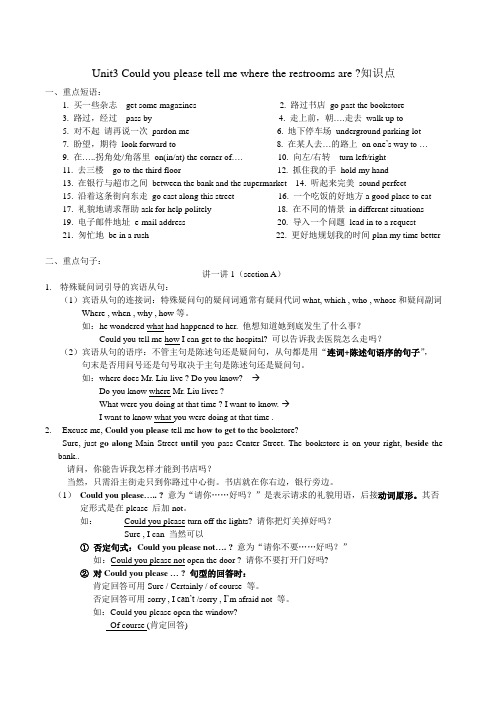
Unit3 Could you please tell me where the restrooms are ?知识点一、重点短语:1. 买一些杂志get some magazines2. 路过书店go past the bookstore3. 路过,经过pass by4. 走上前,朝….走去walk up to5. 对不起请再说一次pardon me6. 地下停车场underground parking lot7. 盼望,期待look forward to 8. 在某人去…的路上on one’s way to …9. 在…..拐角处/角落里on(in/at) the corner of…. 10. 向左/右转turn left/right11. 去三楼go to the third floor 12. 抓住我的手hold my hand13. 在银行与超市之间between the bank and the supermarket 14. 听起来完美sound perfect15. 沿着这条街向东走go east along this street 16. 一个吃饭的好地方a good place to eat17. 礼貌地请求帮助ask for help politely 18. 在不同的情景in different situations19. 电子邮件地址e-mail address 20. 导入一个问题lead in to a request21. 匆忙地be in a rush 22. 更好地规划我的时间plan my time better二、重点句子:讲一讲1(section A)1.特殊疑问词引导的宾语从句:(1)宾语从句的连接词:特殊疑问句的疑问词通常有疑问代词what, which , who , whose和疑问副词Where , when , why , how等。
如:he wondered what had happened to her. 他想知道她到底发生了什么事?Could you tell me how I can get to the hospital? 可以告诉我去医院怎么走吗?(2)宾语从句的语序:不管主句是陈述句还是疑问句,从句都是用“连词+陈述句语序的句子”,句末是否用问号还是句号取决于主句是陈述句还是疑问句。
Unit3Englisharoundtheworld重要知识点梳理汇总
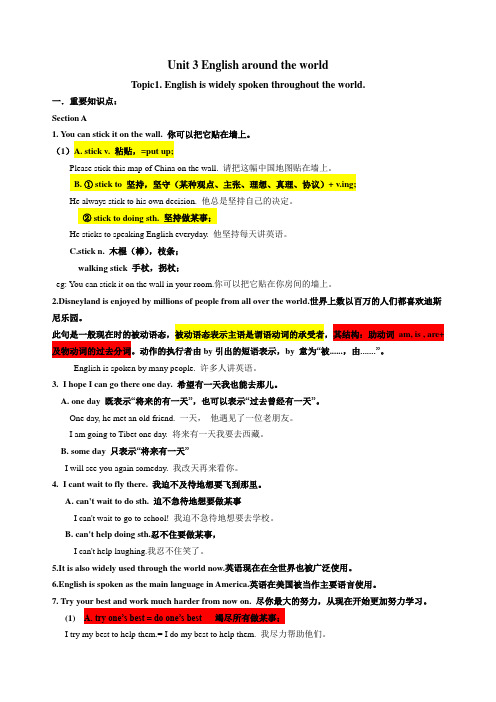
Unit 3 English around the worldTopic1. English is widely spoken throughout the world.一.重要知识点:Section A1. You can stick it on the wall. 你可以把它贴在墙上。
(1)A. stick v. 粘贴,=put up;Please stick this map of China on the wall. 请把这幅中国地图贴在墙上。
B. ① stick to 坚持,坚守(某种观点、主张、理想、真理、协议)+ v.ing;He always stick to his own decision. 他总是坚持自己的决定。
② stick to doing sth. 坚持做某事;He sticks to speaking English everyday. 他坚持每天讲英语。
C.stick n. 木棍(棒),枝条;walking stick 手杖,拐杖;eg: You can stick it on the wall in your room.你可以把它贴在你房间的墙上。
2.Disneyland is enjoyed by millions of people from all over the world.世界上数以百万的人们都喜欢迪斯尼乐园。
此句是一般现在时的被动语态,被动语态表示主语是谓语动词的承受者,其结构:助动词am, is , are+及物动词的过去分词。
动作的执行者由by引出的短语表示,by 意为“被......,由.......”。
English is spoken by many people. 许多人讲英语。
3. I hope I can go there one day. 希望有一天我也能去那儿。
A. one day 既表示“将来的有一天”,也可以表示“过去曾经有一天”。
(人教版)2024七上Unit 3 知识点梳理
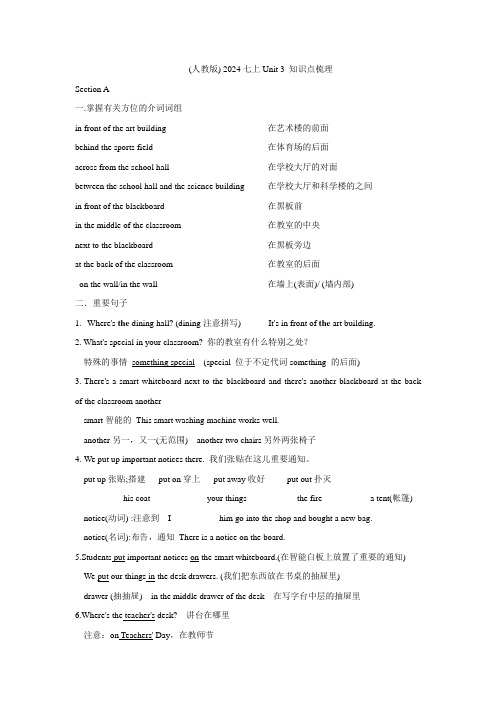
(人教版) 2024七上Unit 3 知识点梳理Section A一.掌握有关方位的介词词组in front of the art building 在艺术楼的前面behind the sports field 在体育场的后面across from the school hall 在学校大厅的对面between the school hall and the science building 在学校大厅和科学楼的之间in front of the blackboard 在黑板前in the middle of the classroom 在教室的中央next to the blackboard 在黑板旁边at the back of the classroom 在教室的后面on the wall/in the wall 在墙上(表面)/ (墙内部)二.重要句子1.--Where's the dining hall? (dining注意拼写) --It's in front of the art building.2. What's special in your classroom? 你的教室有什么特别之处?特殊的事情something special (special 位于不定代词something 的后面)3.There's a smart whiteboard next to the blackboard and there's another blackboard at the back of the classroom anothersmart智能的This smart washing machine works well.another另一,又一(无范围) another two chairs另外两张椅子4.We put up important notices there. 我们张贴在这儿重要通知。
Unit3TheInternet(知识点梳理)-高一英语新教材知识讲学(人教版必修第二册)

人教版新教材高一英语必修二知识点梳理Unit 3 The Internet1. convenient adj.便利的,方便的;近便的(1) It is convenient (for sb.) to do sth. (某人)做某事方便。
be convenient for sb. / sth. 对某人/物来说是方便/近便的(2) at one's convenience在某人方便的时候for ( the sake of) convenience为方便起见e.g. ①It is convenient for me to go there. 我去那儿很方便。
②Our house is very convenient for our children's school. 我们家到孩子们的学校很近。
③Can you telephone me at your convenience to arrange a meeting?你能不能在你方便时给我来个电话,安排见一次面?④For (the sake of) convenience,the library books are separated into different categories. 为方便起见,图书馆的书被分成不同的类别。
温馨提示:convenient作表语时,不可用人作主语,要用物作主语或用it充当形式主语。
表达“如果你方便的话”时,应用if it is convenient for you。
表达“在你方便的时候”时,应用when it is convenient for you。
2. stuck adj. 卡住;陷(入);困(于)(1) be / get stuck in被困在……be stuck with遇到困难无法进行下去;无法摆脱(2) stick to 坚持;信守e.g. ①Have you ever been stuck in a traffic jam? 你曾经遇上过堵车吗?②Will you help me with this mathematical problem? I'm stuck with it. 这道数学题你能帮我一下吗?我怎么也解不出来。
Unit3知识归纳人教版七年级英语下册

Unit 3 How do you get to school ?1.get to 到达2. take the train/subway/bus 乘火车/地铁/公共汽车3.ride a bike骑自行车4. how far 多远how long 多长;多长时间5.from.to.... 从...到....·6.every day.每天7. by bike/bus/train/subway骑自行车/乘公共汽车/乘火车/乘地铁8. have a good day 过得愉快9.walk to school步行去学校10.bus stop/station 公共汽车站11.think of 认为;想起12. bus ride 乘公共汽车(名词短语)13.drive his car 开他的车14. the school bus 校车15. between...and... 在...和...之间16. go on a ropeway 乘/坐索道;滑铁索17. cross the river 过河(动词短语)18. one/an 11yearold boy 一个11岁的男孩19. play with sb / sth 玩...., 和....玩耍20. e true 实现;成为现实21.be like 像....22. many of.. .....中的许多23. school day上学日/ on school days 在上学日用法集萃1.take+冠词+交通工具+to+某地=go to+某地+by+交通工具乘.....去.....2.be afraid to do sth. 害怕做某事,不敢做某事be afraid of ( doing) sth. 害怕(做)某事3.want to do sth. 想要做某事4.have to do sth. 不得不做某事5.How does sb. get to...?某人怎样到达.6.How far is it from...to...?从...到...有多远?7.It is + 距离+ (from A地to B地)从A地到B地有.....8.How long does it take ( sb.) to do..? 做.....花费(某人)多长时间?9.It takes (sb.) + 时间+ to do sth. 做某事花费(某人)一些时间。
八年级下册人教版英语unit3知识点
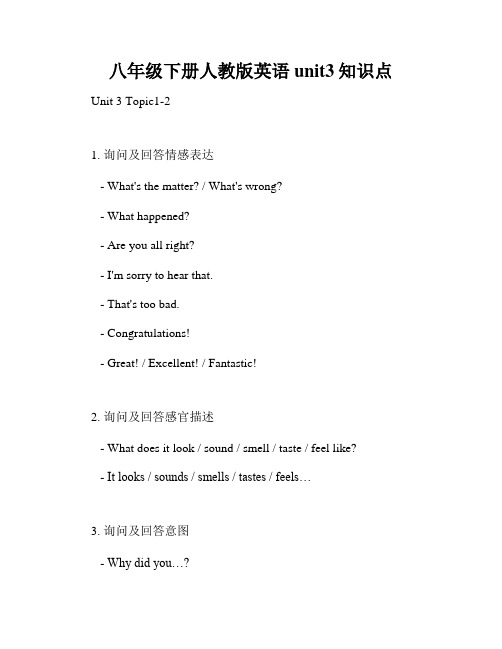
八年级下册人教版英语unit3知识点Unit 3 Topic1-21. 询问及回答情感表达- What's the matter? / What's wrong?- What happened?- Are you all right?- I'm sorry to hear that.- That's too bad.- Congratulations!- Great! / Excellent! / Fantastic!2. 询问及回答感官描述- What does it look / sound / smell / taste / feel like?- It looks / sounds / smells / tastes / feels…3. 询问及回答意图- Why did you…?- What are you going to …?- What do you intend to…?- I intend to… / I plan to…4. 问路及指路,口语表达中熟悉的方向词汇- Excuse me, could you tell me the way to…?- How can I get to…?- The nearest bus stop / subway station / bank / post office is… - It's on the left / right / opposite…Unit 3 Topic 3-41. 表达偏好及兴趣- Would you like…?- What kind of…do you like?- Do you prefer…to…?- I'm into…- I'm fond of…- I enjoy…2. 指出和辨认物品及人物(描述外貌和服装)- What does he / she look like?- He / She has…(描述头发颜色、眼睛、身材特征、穿戴等)3. 询问及描述活动安排- What are you going to do…?- What will you do…?- I'll…4. 描述天气- What's the weather like today?- It's sunny / cloudy / rainy / snowy / windy…- It's hot / warm / cool / cold…Unit 3 Topic 5-61. 表示和理解时间和星期- What time is it?- What's the date today?- What day is it today?- How many days are there in a week?- What do you usually do on weekends?2. 描述行程及活动- Tomorrow, I'm going to…(描述行程)- On Monday / Tuesday / Wednesday…, I usually… - In the morning / afternoon / evening / at night…, I…3. 询问及回答感受- How do you feel?- I feel…(描述感受)4. 描述位置- Where is the…? It's…(描述方位)以上是八年级下册人教版英语unit3的知识点总结,有效巩固这些知识点,可以让你在英语学习中更加得心应手。
(完整版)英语必修三unit3知识点总结
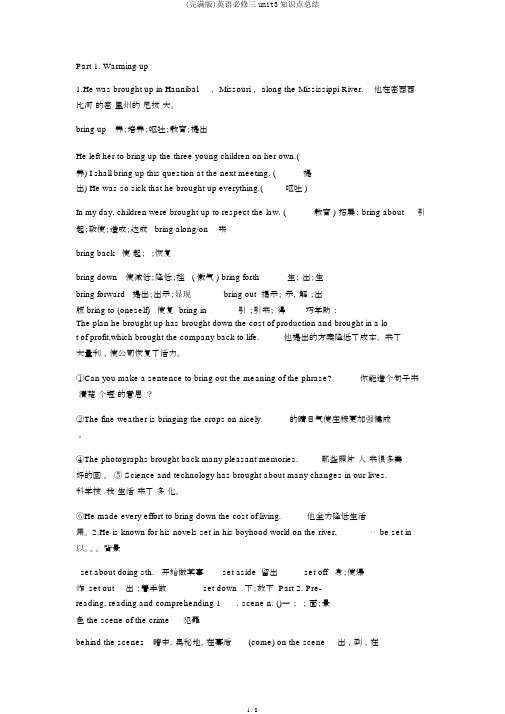
Part 1. Warming up1.He was brought up in Hannibal,Missouri,along the Mississippi River.他在密西西比河的密里州的尼拔大。
bring up养;培养;呕吐;教育;提出He left her to bring up the three young children on her own.(养) I shall bring up this question at the next meeting. (提出) He was so sick that he brought up everything.(呕吐 )In my day, children were brought up to respect the law. (教育 ) 拓展: bring about引起;致使;造成;达成 bring along/on 来bring back使起;;恢复bring down使减低;降低;挫 ( 傲气 ) bring forth生;出;生bring forward 提出;出示;显现bring out 揭示;示,解;出版 bring to (oneself) 使复 bring in引;引来;得巧学助:The plan he brought up has brought down the cost of production and brought in a lot of profit,which brought the company back to life.他提出的方案降低了成本,来了大量利,使公司恢复了活力。
①Can you make a sentence to bring out the meaning of the phrase?你能造个句子来清楚个短的意思?②The fine weather is bringing the crops on nicely.的晴日气使庄稼更加强健成。
人教PEP版英语三年级上册Unit3 Lookatme知识点、考点梳理
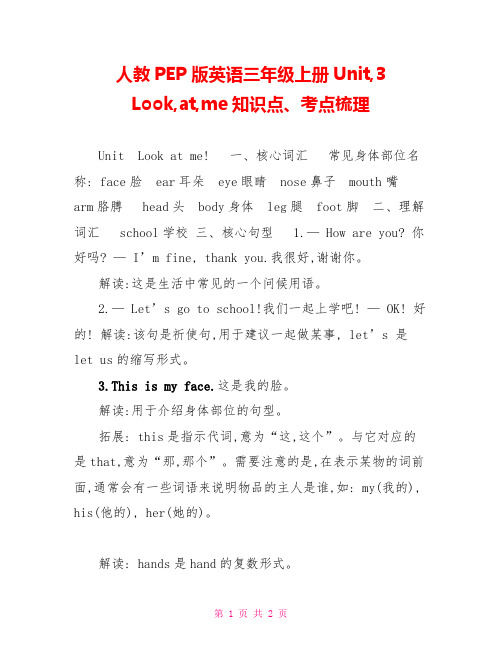
人教PEP版英语三年级上册Unit,3
Look,at,me知识点、考点梳理
Unit Look at me! 一、核心词汇常见身体部位名称: face脸ear耳朵eye眼睛nose鼻子mouth嘴
arm胳膊head头body身体leg腿foot脚二、理解词汇 school学校三、核心句型 1.— How are you? 你好吗? —I’m fine, thank you.我很好,谢谢你。
解读:这是生活中常见的一个问候用语。
2.—Let’s go to school!我们一起上学吧! — OK! 好的! 解读:该句是祈使句,用于建议一起做某事, let’s 是
let us的缩写形式。
3.This is my face.这是我的脸。
解读:用于介绍身体部位的句型。
拓展: this是指示代词,意为“这,这个”。
与它对应的是that,意为“那,那个”。
需要注意的是,在表示某物的词前面,通常会有一些词语来说明物品的主人是谁,如: my(我的), his(他的), her(她的)。
解读: hands是hand的复数形式。
2.St your foot.跺脚。
解读: st作名词时,意思是“邮票”。
作动词时,意思是“跺脚”。
feet是foot的复数形式。
3.Good idea!好主意! 解读:这是对别人的建议表示赞成的常用口语。
- 1、下载文档前请自行甄别文档内容的完整性,平台不提供额外的编辑、内容补充、找答案等附加服务。
- 2、"仅部分预览"的文档,不可在线预览部分如存在完整性等问题,可反馈申请退款(可完整预览的文档不适用该条件!)。
- 3、如文档侵犯您的权益,请联系客服反馈,我们会尽快为您处理(人工客服工作时间:9:00-18:30)。
in front of
in the front of
在…前面 (外部的前面)
在…前面 (内部的前面)
4.The teacher asked me to speak in front of ____________ in the front of the students , so I stand ________________ the classroom.
take place 常指按计划或安排发生
1. 当我看见这条蛇时,我很害怕。 was scared I _________ _______ when I saw the snake. 2.我很害怕坐飞机。
I am _______ ______take _________ a plane . scared to scared of taking
1. 这条蛇昨天使我吃了一惊。 The snake surprised me ______ ________ yesterday. 2.我对这条蛇感到很吃惊。 surprised at I was _______ ________ the snake . 3.昨天我吃惊的遇见她了。 surprised to meet I was ________ _______ ______ her.
Task : Review Unit 3 (复习unit 3知识点的运用) Read and recite the language points (背诵知识点)
1. The boy ________ the bus station . A B 2. I ________ Shanghai yesterday. D 3. The police _________ there very soon. D 4. My mother_________ home at eight last night. A. arrived at B. arrived in C. reached to D. got arrive in , arrive at , get to , reach都为到达。 arrive in + 大地方 arrive at + 小地方
be scared = be afraid be scared to do sth = be scared of doing sth 3.他怕的不能再走路了。 scared couldn’t walk He was so _______ that he ______ ______ anymore. scared _______ anymore . = He was too ______ to walk
What +n短语 +主语+谓语!
How + adj / adv +主语+ 谓语! 2. _____ bad weather ! A A. What B. What a C. How D. How a 3.多么漂亮的花啊! What ___________ flowers they are! __________beautiful = __________ ________ the flowers are! How beautiful
surprise 5.To our teacher’s ________ , Tom passed the exam.
1.多么有趣的一本书! ______ ______ interesting book ! What an ________ interesting the book is ! How
Tom __________ (listen) to music now. is listening is playing Look! Tom _______________ (play) basketball with his friends. 现在进行时:be (am /is /are )+ doing have been learning I ________________ (learn) since I was 8 years old . has been skating Tom ___________________(skate) for 4 hours. 现在完成进行时: have / has been doing sth 过去进行时: be (was/ were ) + doing
Unit 3
White –board show
Check the words and phrases.
(检查单词,词组)
过去进行时:一表示过去某一时刻正在进行的动作。
二 表示过去某阶段正在进行的动作。 结构: be ( was / were) + doing 1. I _________________(watch) TV at eight last night . was watching 2. The boy was shopping ______________(shop) when the alien got out .
surprise sb 使吃惊某人
(动词)
be surprised at sth 对…感到吃惊 (形容词)
名词 be surprised to do sth = do sth in surprise 吃惊地做某事
to one’s surprise 使某人吃惊地是 名词
形容词
urprising 4.The s___________ news s___________ him. urprised
Sum up
1.过去进行时:
2.到达的几种表达方法
3. in front of / in the front of用法区别
4. surprise 用法
5.感叹句
6. happen用法
7. happen / take place 用法区别
8. scared 相关用法 …
当堂检测:
on 1.There are some apples ______ the tree. 2.You should ________ (考虑)yourself, Don’t think about/of ___________________(考虑帮助)others all the time think about/of helping 3.____ ____happen (将会发生什么)in 20 years. What will _____ 4.Ihappened to _____ ______(碰巧找到) the answers. _____ ____ find out 5.I am____ ____ _______ (害怕谈话)with strange m scared of talking/to talk 6.I saw a plane ________(起飞)。 take off was playing 7.I ___________(play) on the playground when the UFO ________(land) landed
get there / here / home (到达地方为副词时,介词去掉) B When did you ____ the Olympic Village yesterday? A. arrive B. reach C. get D. go
A 1.There is a big garden ______ the building . 2.Some boys are sitting ______ the bus. B A 3.There is a tree _____ the classroom. A. in front of B. in the front of
3.婚礼什么时候举行?
碰巧做某事
take place When will the wedding ______ _______? 4.运动会将于下周举行。 take place The sporting meeting will _______ ______ next week.
happen 偶然或无意间发生
1. A car accident ___________ to Mary yesterday. happened 2.He happened to think of the thing .(他碰巧想起这件事) _________ sth happen to sb 某事发生在某人身上
happen to do sth
While was shopping = ______ the boy _______________ ,the alien gout . when : 从句中一般用非延续性动词,不能用进行时态。
while : 总是指一个时间段,从句中必须用延续性动词, 用进行时态。 While 3.__________ we were drawing pictures ,the teacher came in . 4.________ I arrived in Beijing ,it was dark. When
